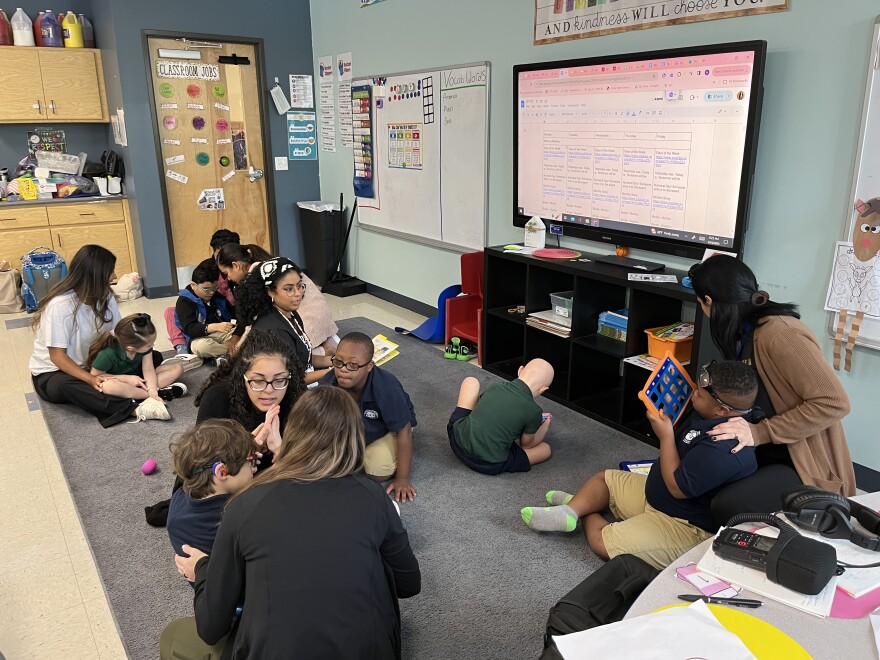Walkers and wheelchairs line the hallways at UCP Bailes Community Academy, a K-8 charter school in Orlando where half of the students have disabilities.
UCP stands for "unlocking children's potential." The nonprofit UCP Central Florida runs this and seven other inclusion schools, where students with physical, behavioral or learning disabilities are integrated into general education classrooms as much as possible. They are also given the support and accommodations they need to succeed alongside their peers.
On this Wednesday morning in January, a class of nine students starts the school day with Haley Thrift. She delivers specialized instruction in core academic subjects, before sending them back to their inclusion classrooms at noon.

During her morning lessons, the class sang a song to help them learn the days of the week, and then they practiced yoga, all with the help of an occupational therapist and a speech therapist.
"There is still a need for those kiddos who have those higher intensity needs and behavioral needs to come into a smaller classroom," said Thrift, who has been teaching at the school for three years. Then, “they still get that social and emotional aspect with their typical gen-ed peers.”
While working full time and taking classes at night, Thrift earned her master’s in exceptional student education from the University of Central Florida as part of a federally funded program called Project Bridges. In return, she will teach students with disabilities for at least four years.
The U.S. Department of Education spends $115 million annually on programs similar to UCF's Project Bridges around the country. Federal data show more than 90% of recent scholarship recipients nationally are working in their field until they’ve met their service obligation. That's either two or four years later, depending on the student.
Project Bridges is one of the initiatives WLRN is reporting on in our series Role Call, examining taxpayer-funded programs that aim to reverse the ongoing and pervasive teacher shortage. Special education teachers represent the biggest need.
Many students with disabilities are taught by unqualified teachers
Across the country, there are more than 7 million K-12 students who require special education, and 15% of Florida students fall into that category.
State projections show Florida public schools are short 2,500 special education teachers for the upcoming academic year.
State data show during the 2022-23 school year, nearly 16% of courses for students with special needs were taught by teachers not certified in that field.
Since Project Bridges launched at UCF in 2015, 56 people have graduated from the program with special education degrees.

While the need for special education teachers is much higher than the program is able to meet, Oliver Edwards, chair of UCF’s Department of Counselor Education and School Psychology, argued every bit of progress counts.
“Our project may be somewhat small in the grand scope of things, but I think it really adds to what’s happening here in Florida in terms of increasing the quantity and quality of teachers and school psychologists in our schools," he said. "And if they only impact one, two, 10, 20 students, and change their lives for the better, that is a tremendous benefit for our state and for our nation.”
While the federal government reports high success rates from this and programs like it, officials do not track these teachers beyond their two- or four-year service obligation.
Kansas State University education researcher Tuan Nguyen told WLRN that’s a problem. In order to measure the effectiveness of these programs, he said we need to collect long-term data.
“In terms of keeping track of how much money do we spend, how long do they stay in the profession, where is the need the greatest…we have to be able to know these things in order to come up with solutions.”

Thrift, the Orlando teacher, knew as early as middle school that she wanted to work with students with disabilities.
“I took an elective course called 'future teachers,' and I was placed in the school’s autism unit, and from there, I just fell in love with working with individuals with special needs,” she said.
Earning a master's degree didn’t give her a huge jump in her salary — only 4% — from $50,500 to $52,500. But she said it made a big difference in her classroom performance.
“It changed my life in this field," she said. "It’s made a huge impact on my students and the way that I teach, so it’s definitely worthwhile.”
This story is part of <i>Role Call</i>, a WLRN project produced with support from the Education Writers Association.







